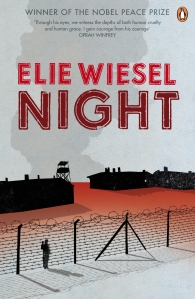Tags
The review first appeared in January 2013 issue in Emel Magazine.
Night By Elie Wiesel, new ed. and translation by Marion Wiesel (2006) 144 Pages. Penguin: 2006.
 In just over 100 pages, Elie Wiesel’s terse narrative is one of the classics of Holocaust literature. Set at the end of WW2, his childhood is ruptured when his small Jewish community in Eastern Hungary is forcibly ghettoised and then transported to the concentration camps, Auschwitz and Buchenwald. Amidst the cruelties of man, Eliezer gives an harrowing account of life in the camps, his abandonment of his father and his loss of faith in God.
In just over 100 pages, Elie Wiesel’s terse narrative is one of the classics of Holocaust literature. Set at the end of WW2, his childhood is ruptured when his small Jewish community in Eastern Hungary is forcibly ghettoised and then transported to the concentration camps, Auschwitz and Buchenwald. Amidst the cruelties of man, Eliezer gives an harrowing account of life in the camps, his abandonment of his father and his loss of faith in God.
Night blurs the boundaries between memoir, biography and novel. Unlike many other testimonies, the conditions of the camp and its prisoners are kept murky and the narrative focuses on Eliezer’s estrangement from man and God. Critics, historians and survivors among them, have challenged many of the novel’s details and accused Wiesel of embellishing the story to increase its power. However, Ruth Franklin, a notable literary critic, argues that while Night is less than veridical, in ruthlessly pruning his original 800 page Yiddish account, ‘a powerful work of art emerges from an angry historical account’.
After the separation of the family, most of the attention focuses on Eliezer’s attempts to be with his father. These grow increasingly desperate as his father’s health declines and the teenager becomes the carer. In the clamour for survival, his father becomes, to his guilt and resentment, an increasingly heavier burden threatening his own existence. Six weeks before liberation his father dies. The night before his father is beaten by the guards, and the son is reluctant to come to his aid. In the morning, upon discovering his father’s death, to his eternal shame Eliezier finds a voice within, ‘Free at last!’.
The loss of his father is mirrored by the loss of his faith. A deeply observant child and immersed in religious study, Eliezer enjoys a childhood bathed in faith. Despite his youth he is attracted to Kabbalistic mysticism. Ignoring adult disapproval, he finds himself a guide who teaches him wisdom. But when war arrives his relationship changes. At first, he compares himself to the Biblical Job, doubting God’s justice if not His existence. As the horror increases, anger grows within him. After a child is hung in courtyard, his faith is consumed. Shortly after, when other prisoners celebrate the Jewish New Year, Eliezier finds he cannot. How can he bless the Eternal name of God, he wonders, when He ran the crematoria for 6 days and 6 nights burning to ashes all those within. He will not plead or lament to the One who chose them amongst all nations to be tortured. Instead he would be the accuser, and God the accused. The revolution is complete; the boy who craved union with the Eternal is alone from God.
It is Eliezer’s changing relationship to God that has most resonance. At no point does he cease to believe in His existence, but God dies for him nevertheless. That existence has horrors, there can be no doubt. They cannot be pretended away, they lie in wait. Only when confronted by them do we discover the true mettle of our faith. Until then we are in the dark. And this dilemma Night presents most forcefully, ‘what would I do were I in his place?’ When the trial of God falls on us and leaves us dazed, will I still believe, holding fast affirming His Goodness? Or will the dissensions of my soul betray me? Will my words come out hollow, empty of feeling? Will they come out at all?
And this can only be answered in the first person singular. Its not a question of what is correct and right, and what one ought to say – it is my reaction that counts. It may be, when assailed by doubt, holding fast to a good opinion of God may be the hardest struggle of all. That in the blackest of nights, sometimes, faith is a force of will. And like so, Night reveals the Abrahamic essence of faith.
Further Reading
‘The Story of ‘Night’’ – Rachel Donadio, NY Times, ‘Night by Elie Wiesel’ – Phil Mongredien, Observer,
Truth and Lies in Holocaust Literature
‘A Thousand Darknesses’ – Ruth Franklin, The New Republic
– ”Ruth Franklin’s A Thousand Darknesses,’ on Holocaust fiction’ – Susie Linfield, Washington Post, ‘A Thousand Darknesses: Lies and Truth in Holocaust Fiction, by Ruth Franklin’ – Myrna Goldenberg, ‘Can it be described?’ – Jonathan Mirsky, The Spectator
Other
‘A Conversation With Elie Wiesel’ – Rachel Levy, The Atlantic, ‘Wiesel Words’ – Christopher Hitchens, The Nation, ‘Elie Wiesel, The Art of Fiction No. 79’ Interviewed by John S. Friedman, The Paris Review

Pingback: 12 Non-fiction Books You Need To Read In Your 20sBeepWeep
Pingback: 12 Non-fiction Books You Need To Read In Your 20s | CrunchyBytes
Pingback: 12 Non-fiction Books You Need To Read In Your 20s - storypiks
Pingback: Fully packed of adventures “Night” – Philip